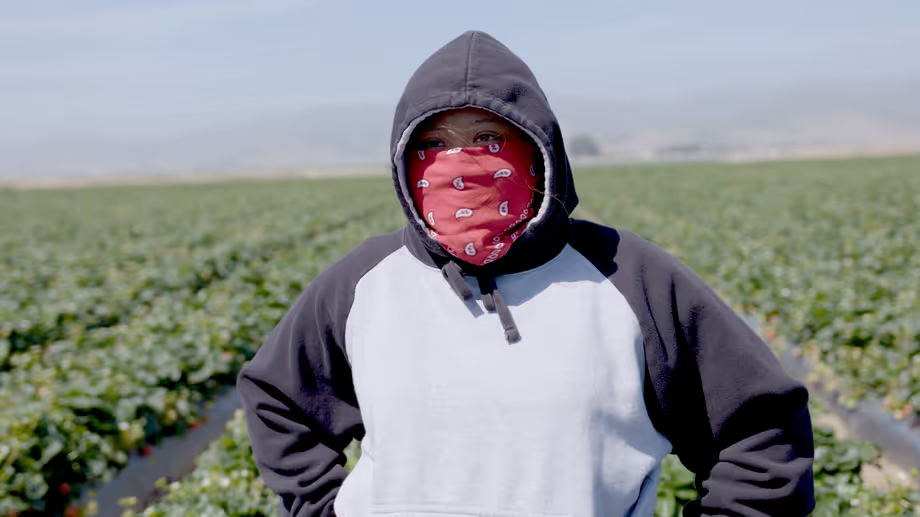Fruits of Labor Discussion Guide Discussion Prompts
Discussion Prompts

STARTING THE CONVERSATION
Immediately after the film, you may want to give people a few quiet moments to reflect on what they have seen. You could pose a general question (examples below) and give people some time to themselves to jot down or think about their answers before opening the discussion. Alternatively, you could ask participants to share their thoughts with a partner before starting a group discussion.
What are two or three new things you learned from watching the film?
Did the film encourage you to reconsider and subsequently change any ideas, views, or assumptions you had about immigrants and immigrant families prior to watching the film?
Which person in the film could you most relate to and why?
Did the film leave you with any questions or something you’d like to learn more about? If yes, what?
Perception of Immigrants
Historically, do you think that the U.S. has been a country that welcomes immigrants? Can you think of any events that have impacted the ways the U.S. responds to immigrants? In what ways do these events impact how the U.S. supports undocumented people?
The reasons for immigrating are sometimes divided into two categories: ‘push’ and ‘pull’ factors. Push factors are reasons that compel or push people to leave the area of where they reside and pull factors are reasons that attract or pull people to move and settle in a particular area. Can you think of examples of 'push' factors that might result in someone needing to leave their home country, even if they preferred to stay?
If you were suddenly forced to move from your home country, what do you imagine would be some of the most difficult aspects of living in a foreign country?
John F. Kennedy once said, “Everywhere immigrants have enriched and strengthened the fabric of American life.” Discuss some of the positive impacts you feel immigrants have on your community.
Roles and Responsibilities in the Family
Describe the roles that different members in your family took on when you were growing up. How influential of a part do you think gender played in designating these roles?
Though close in age, the weight of family responsibilities fall much more heavily on Ashley than they do on her brother, Ashland. Why do you think that is?
What role do you believe culture and society play in the way that gender roles manifest within families?
Ashley’s mom used to tell her that, “Once you get the tortilla to puff up on the stove, you’ll be ready to marry.” In western society, cooking has traditionally been considered a responsibility of women. Can you think of other roles that we delegate within relationships, based on gender?
Life as a Teenager
Can you recall some of the greatest challenges and responsibilities that you faced as a teenager? If you are a teenager now, what are some of the challenges that are currently weighing most heavily on you? What mistakes did you make when confronting them and what were some of the most significant lessons you took away?
"I feel an enormous weight on my shoulders. I am the only one who can take care of my siblings if something were to happen to my mother." Ashley expresses these feelings amidst the growing fear surrounding ICE raids in the area and grave concerns over the possibility of her mother being deported. When you were a teenager, or now, if you are currently a teenager, do you believe you would have been able to take on the responsibility of caring for younger siblings? What would have been some of the greatest sacrifices you would have had to make if being a parent suddenly became your main role in the family?
Towards the end of the film, Ashley says: "This past year, I transformed from a scared turtle to a flower in bloom, just like my grandma told me I would, just like the curandera who told me not to fear my power. Flowers bloom out, they produce sweet fruit. Fruits remind me of my ancestors, who tell me not to give up." Can you remember a pivotal moment or period during your teenage years when you went through some of your most important transitions? What encouraged or inspired this metamorphosis? In what ways did you end up blooming?
Experiences of Immigrants and Mixed-Status Families
What are some reasons undocumented people decide to come to the United States? In what ways did Fruits of Labor help you widen your perspective on the nature (and implications) of these difficult choices immigrants make?
What might families’ who leave their home country’s miss most about the country and communities they left behind? Do you have any first-hand knowledge or experience that speaks to this that you would feel comfortable sharing?
Undocumented workers are also burdened with paying annual taxes on their wages and are commonly made to pay much more than US citizens who work low-wage jobs. Recognizing that undocumented immigrants are forced to pay billions in taxes without receiving protections and supports from US policy, lawyers and policymakers in California are working on legal interventions which will provide all low-wage workers (including undocumented people) with tax breaks. How does the experiences of being undocumented impact representation in justice movements (like workers’ rights) and likelihood of attaining equality?
What are some of the greatest concerns about being undocumented or having family members who are undocumented?
In what ways do experiences of peoples’ family members being detained or deported drastically impact their lives? Aside from the emotional and psychic toll detainment/deportation has on all family members involved, what are some additional struggles you learned about by watching this film?
As a mixed-status family where some family members are undocumented and others are granted citizenship, what are some challenges and vulnerabilities these families experience that other families do not?
What, in your understanding of the naturalization process, are some of the greatest hurdles faced during the process of seeking to attain US citizenship?
What do you wish that more people knew about immigrants/immigrant families?
